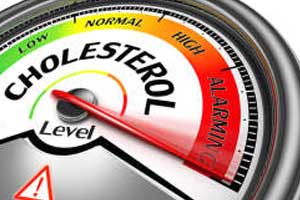- Home
- Editorial
- News
- Practice Guidelines
- Anesthesiology Guidelines
- Cancer Guidelines
- Cardiac Sciences Guidelines
- Critical Care Guidelines
- Dentistry Guidelines
- Dermatology Guidelines
- Diabetes and Endo Guidelines
- Diagnostics Guidelines
- ENT Guidelines
- Featured Practice Guidelines
- Gastroenterology Guidelines
- Geriatrics Guidelines
- Medicine Guidelines
- Nephrology Guidelines
- Neurosciences Guidelines
- Obs and Gynae Guidelines
- Ophthalmology Guidelines
- Orthopaedics Guidelines
- Paediatrics Guidelines
- Psychiatry Guidelines
- Pulmonology Guidelines
- Radiology Guidelines
- Surgery Guidelines
- Urology Guidelines
HDL cholesterol greater than 60 mg/dl increases risk of heart attack-ESC Update

An increased risk of heart attack and death may be associated with very high levels of high-density lipoprotein (HDL) or "good" cholesterol, reports a research presented at ESC Congress 2018. Participants with HDL cholesterol levels greater than 60 mg/dl (1.5 mmol/L) had a nearly 50% increased risk of dying from a cardiovascular cause or having a heart attack.
HDL C molecule is involved in the transport of cholesterol from the blood and blood vessel walls to the liver from where it is excreted out of the body, ameliorating the risk of clogged arteries and atherosclerosis. People with low HDL C have a greater risk of atherosclerosis and cardiovascular disease.
"It may be time to change the way we view HDL cholesterol. Traditionally, physicians have told their patients that the higher your 'good' cholesterol, the better. However, the results from this study and others suggest that this may no longer be the case,” said the study author Dr. Marc Allard-Ratick.
Read Also:Good cholesterol’ does not decrease heart disease risk in postmenopausal women
The researchers conducted a study to investigate the relationship between HDL C levels and the risk of heart attack and death in 5,965 individuals, most of whom had heart disease. The mean age of participants was 63 years out of which 35% were female.
Participants were divided into five groups according to their HDL C level and followed for 4 years.
a.Less than 30 mg/dl (0.78 mmol/L), b.31-40 mg/dl (0.8-1 mmol/L) c. 41-50 mg/dl (1.1-1.3 mmol/L), d.51-60 mg/dl (1.3-1.5 mmol/L) and e. Greater than 60 mg/dl (1.5 mmol/L).
Key study findings:
- 769 (13%) participants had a heart attack or died from a cardiovascular cause.
- Participants with HDL C 41-60 mg/dl (1.1-1.5 mmol/L) had the lowest risk of heart attack or cardiovascular death.
- The risk was increased both in participants with low levels (less than 41 mg/dl) and very high levels (greater than 60 mg/dl) of HDL cholesterol, which produced a U-shaped curve when plotted graphically.
- Participants with HDL C levels greater than 60 mg/dl (1.5 mmol/L) had a nearly 50% increased risk of dying from a cardiovascular cause or having a heart attack compared to those with HDL cholesterol levels 41-60 mg/dl (1.1-1.5 mmol/L).
The associations were consistent even after controlling for other risk factors for heart disease such as diabetes, smoking, and low-density lipoprotein (LDL or "bad") cholesterol, as well as other factors linked with high HDL C such as alcohol intake, race, and sex.
The researchers concluded that the mantra of HDL cholesterol as the 'good' cholesterol may no longer be the case for everyone.
"Our results are important because they contribute to a steadily growing body of evidence that very high HDL C levels may not be protective, and because unlike much of the other data available at this time, this study was conducted primarily in patients with established heart disease, "write the authors.

Disclaimer: This site is primarily intended for healthcare professionals. Any content/information on this website does not replace the advice of medical and/or health professionals and should not be construed as medical/diagnostic advice/endorsement or prescription. Use of this site is subject to our terms of use, privacy policy, advertisement policy. © 2020 Minerva Medical Treatment Pvt Ltd